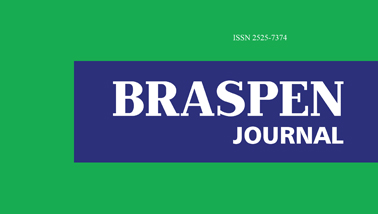Evolução do estado nutricional em pacientes com câncer de cabeça e pescoço em radioterapia ou quimiorradioterapia
Evolution of the nutritional state in patients with head and neck cancer in radiotherapy or chemoradiotherapy
Francielle de Cássia Silva, Thiago Celestino Chulam, Thaís Manfrinato Miola
Resumo
Introdução: O sítio tumoral e as modalidades terapêuticas utilizadas podem causar importantes alterações fisiológicas e sintomas em pacientes com câncer de cabeça e pescoço, que, em geral, levam à perda de peso, com consequente aumento da toxicidade do tratamento e complicações. O acompanhamento nutricional e a detecção precoce da desnutrição são essenciais para a adequada intervenção nutricional. O presente estudo comparou o estado nutricional dos pacientes assistidos ou não pelo serviço de nutrição, antes e após o tratamento radioterápico ou quimiorradioterápico. Método: Estudo retrospectivo, de coorte e observacional. Amostra composta por 57 pacientes com diagnóstico de carcinoma epidermoide de vias aéreas digestivas superiores, sendo 23 em acompanhamento nutricional e 34 não acompanhados. Comparou-se o estado nutricional por bioimpedância elétrica, no início e fim do tratamento, naqueles que acompanharam com a equipe de nutrição. A avaliação do peso e perda ponderal foi realizada entre os 2 grupos, além da presença de sintomas. Resultados: A amostra total apresentou perda ponderal significativa durante o tratamento, com peso médio inicial de 77,6 kg e final de 72,4 kg (p<0,001), o grau desta perda foi maior nos pacientes que não foram assessorados pela equipe de nutrição (61,8% vs. 26,1%; p=0,044). Os pacientes em acompanhamento manifestaram maior perda de massa gorda (2,1 kg) do que massa magra (1,5 kg). Não houve diferença no valor do ângulo de fase (AF) entre o início e fim do tratamento (p=0,249). Quanto aos sintomas, a disfagia mostrou-se mais prevalente no grupo em acompanhamento (60,9% vs. 2,9%; p<0,01), mucosite em pacientes com câncer de cavidade oral e faringe (p=0,003) e odinofagia em câncer de laringe (p=0,029). Conclusão: O acompanhamento nutricional conseguiu minimizar a perda de peso entre os pacientes, enfatizando a importância da assistência nutricional em pacientes portadores de tumores de cabeça e pescoço submetidos a tratamento radioterápico combinado ou não à quimioterapia.
Palavras-chave
Abstract
Introduction: The tumor site and the therapeutic modalities used may cause important physiological changes and symptoms in patients with head and neck cancer, which generally lead to weight loss with consequent increased treatment toxicity and complications. Nutritional monitoring and early detection of malnutrition are essential for appropriate nutritional intervention. The present study compared the nutritional status of patients assisted or not by the nutrition service, before and after radiotherapy or chemoradiotherapy treatment. Methods: Retrospective, cohort, observational study. Sample comprised 57 patients diagnosed with squamous cell carcinoma of the upper digestive tract aerial, 23 in nutritional follow-up and 34 not in follow-up. Nutritional status was compared by electrical bioimpedance at the beginning and end of treatment in those who followed up with the nutrition team. Weight and weight loss were evaluated between the 2 groups, as well as the presence of symptoms. Results: The total sample showed significant weight loss during treatment, with mean initial weight of 77.6 kg and mean final weight of 72.4 kg (p<0.001), the degree of this loss was greater in patients who were not advised by the nutrition team (61.8% vs. 26.1%; p=0.044). The patients in follow-up, manifested greater loss of fat mass (2.1 kg) than lean mass (1.5 kg). There was no difference in the phase angle (PA) value between the beginning and end of treatment (p=0.249). As for symptoms, dysphagia was more prevalent in the follow-up group (60.9% vs. 2.9%; p<0.01), mucositis in patients with cancer of the oral cavity and pharynx (p=0.003) and odynophagia in laryngeal cancer (p=0.029). Conclusion: Nutritional monitoring was able to minimize weight loss among patients, emphasizing the importance of nutritional assistance in patients with head and neck tumors undergoing radiotherapy treatment combined or not with chemotherapy.

